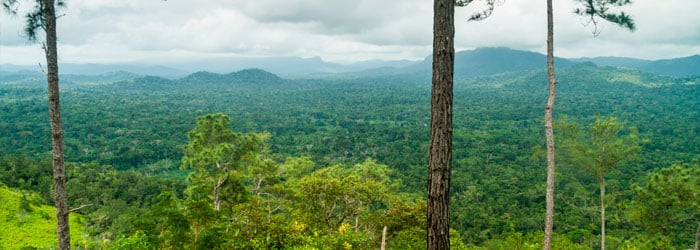News Bin - March 13, 2019
Bringing you the latest news, information, and resources from around the web. In the March 13th edition, read more about the following:
- 6 plastic-free ways to travel with safe drinking water
- Climate-driven evolution in trees alters their ecosystems
- Climate change is leading to unpredictable ecosystem disruption for migratory birds
- Rare orca sighting could confirm new species
- Fin whales and mountain gorillas back from the brink of extinction thanks to conservation efforts
- UN Climate Change and WTTC highlight role of travel and tourism in attaining a carbon neutral world by 2050
6 plastic-free ways to travel with safe drinking water
Staying hydrated when you travel can be a challenge, particularly in places where tap water is unsafe or unavailable. Rather than reaching for a single-use plastic bottle and contributing to the world’s plastic problem, learn some new strategies for safe water consumption wherever you roam.
Climate-driven evolution in trees alters their ecosystems
A new study explores how climate, evolution, plants, and soils are linked. The research is the first to show how climate-driven evolution in tree populations alters the way trees directly interact with their immediate soil environment.
Climate change is leading to unpredictable ecosystem disruption for migratory birds
Using data on 77 North American migratory bird species from the eBird citizen-science program, scientists at the Cornell Lab of Ornithology say that, in as little as four decades, it may be very difficult to predict how climate change will affect migratory bird populations and the ecosystems they inhabit.
Rare orca sighting could confirm new species
The elusive "Type D" killer whale, seen only in photographs from 1955, has finally been spotted in the wild by a team of scientists with the National Oceanic and Atmospheric Administration. These whales have been notoriously difficult to locate and study due to the rough weather in their habitat, the waters between South America and Antarctica. Now that they have a few skin samples, the scientists hope to analyze the Type D killer whales' DNA and compare it to that of the common killer whale, with whom they don't appear to socialize, despite broad physical similarities.
Fin whales and mountain gorillas back from the brink of extinction thanks to conservation efforts
There is hope for the survival of fin whales and mountain gorillas after conservationists announced both species have been pulled back from the brink of extinction. Previously listed as endangered, fin whale numbers have roughly doubled since the 1970s; the population now stands at 100,000 mature individuals. In central Africa, anti-poaching patrols and the concerted removal of snares has helped boost mountain gorilla numbers from 680 individuals a decade ago to over 1,000 now, the highest figure ever recorded.
UN Climate Change and WTTC highlight role of travel and tourism in attaining a carbon neutral world by 2050
During the first Travel & Tourism event ever held at the annual COP, both organisations addressed the links between travel, tourism and climate change and presented a pathway for the sector to achieve carbon neutrality by 2050.


